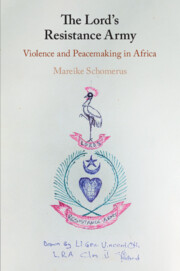Book contents
- The Lord’s Resistance Army
- The Lord’s Resistance Army
- Copyright page
- Contents
- Figures
- Acknowledgements
- Note on the Text
- Abbreviations and Acronyms
- 1 Introduction
- 2 The Lord’s Resistance Army
- 3 The Juba Peace Talks with the Lord’s Resistance Army in 2006
- 4 ‘Am I an Animal?’
- 5 The Juba Peace Talks with the Lord’s Resistance Army in 2007
- 6 ‘Reach Out a Hand and Pull It Back’
- 7 The Juba Peace Talks with the Lord’s Resistance Army in 2008
- 8 ‘LRA Has Already Become a System’
- 9 ‘We Are All Learning in This Peace Process’
- References
- Index
7 - The Juba Peace Talks with the Lord’s Resistance Army in 2008
‘Maybe We Came Too Close to the Enemy’
Published online by Cambridge University Press: 09 April 2021
- The Lord’s Resistance Army
- The Lord’s Resistance Army
- Copyright page
- Contents
- Figures
- Acknowledgements
- Note on the Text
- Abbreviations and Acronyms
- 1 Introduction
- 2 The Lord’s Resistance Army
- 3 The Juba Peace Talks with the Lord’s Resistance Army in 2006
- 4 ‘Am I an Animal?’
- 5 The Juba Peace Talks with the Lord’s Resistance Army in 2007
- 6 ‘Reach Out a Hand and Pull It Back’
- 7 The Juba Peace Talks with the Lord’s Resistance Army in 2008
- 8 ‘LRA Has Already Become a System’
- 9 ‘We Are All Learning in This Peace Process’
- References
- Index
Summary
This chapter focuses on the 2008 events in the Juba Peace Talks between the Lord’s Resistance Army/Movement (LRA/M) and the Government of Uganda, which ended with joint military strikes by Ugandan and US forces (called Operation Lightning Thunder) against the LRA. LRA leader Joseph Kony had repeatedly failed to sign the Final Peace Agreement amidst growing confusion over demand and the role of the LRA/M delegates. In 2008, previously less obvious patterns of mistrust and miscommunication in the peace talks came to the fore, exacerbated by parallel preparations for war and peace and confusing international signals. The USA took on a new and prominent role, working behind the scenes to assure military preparations while also being an observer at the talks. Within the delegation, roles of individuals became increasingly bewildering. Yet despite the tremendous frustrations in the negotiation process and the missed opportunity to celebrate the Final Peace Agreement with a fully planned signing ceremony in the bush attended by 150 guests, the fall out of the military Operation Lightning Thunder shows the gravity of the decision to abandon the often-frustrating negotiation process in favour of what mistakenly continues to be sold as the quicker solution.
Keywords
- Type
- Chapter
- Information
- The Lord's Resistance ArmyViolence and Peacemaking in Africa, pp. 194 - 227Publisher: Cambridge University PressPrint publication year: 2021



